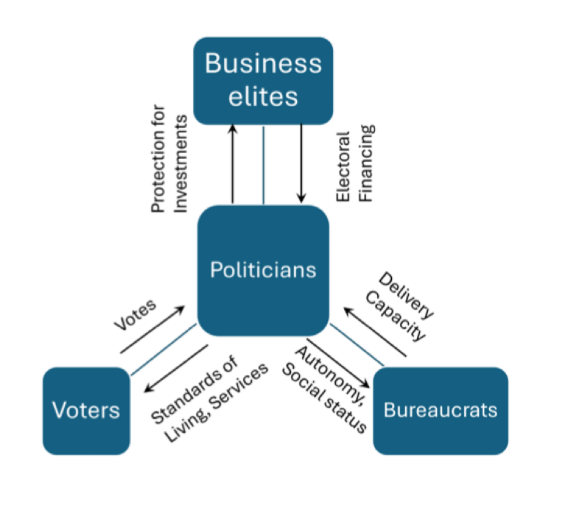L14: Developmental Coalitions
1/20
There's no tags or description
Looks like no tags are added yet.
Name | Mastery | Learn | Test | Matching | Spaced |
|---|
No study sessions yet.
21 Terms
Developmental Coalition
a broad coalition with concentrated enforcement power that directs rents to invest in development
depends on the relationship between political and economic elites
Who is included in developmental coalitions?
Made up of winners, losers, women, excluded people, business men → everyone needs to be involved for this to work
Developmental coalition: key parts of definition
Broad coalitions
Concentrated power
Rents directed to investment
key parts of definition: broad coalitions
Key economic and political elites are part of the coalition
So institutions are inclusive, not extractive
So there's 'Embededness' between the bureaucracy and private sector
So losers are credibly compensated and don't resist
So Collective action is able to shift the equilibrium
Key parts of definition: concentrated power
The leader can discipline members of the coalition → someone is on top
So institutions are enforced
Accountability limits corruption and clientelism
Does not eliminate it → Ensuring corruption/favoritism 'buys' development by protecting investments and compensating the losers
Autonomy of bureaucrats is protected
key parts of definition: rents directed to investment
A Developmental State: "Centralizing the management of economic rents"
'Embedded' autonomy coordinates and protects investments
Developmental coalitions do not avoid politics
They make development politically successful:
Business elites get investment opportunities and protection if they provide electoral financing
Bureaucrats earn professional and social praise from delivering services, not corruption
Voters reward politicians for development
Key actors in development
Business elite
Voters
Bureaucrats
Development is grounded in new relationship between key actors
By giving something to each key actor, you get something back that will benefit development

Other types of coalitions on development
make development politically unattractive →prevent development
Narrow coalitions
Extractive
Benefit from keeping competing groups poor
How do we make developmental coalitions sustain?
Policy feedback
Policy feedback
policies and institutional reforms change future politics
How is policy design used?
not a question of technical cost-benefit analysis
Or measuring 'pro-poor' impact
But anticipating how policies can raise the political pressure for future development through:
Accountability
Collective Action
Representation
Policy feedback Bolsa Familia example
Bolsa Família cash transfers in Brazil have created a strong vested interest defending the program
Accountability: A programmatic policy giving voters the economic security to reject
clientelismCollective Action: A new collective identity and pride among poor beneficiaries
Representation: Benefits go to mothers, strengthening their political power
political reward: keep program going, people more likely to vote for current party in power
Developmental coalitions in Rwanda: reason they have been able to develop
1. Broad coalition
Politicians
Business, military elites
Tutsis and Moderate Hutus
Women
2. Concentrated Power
The Rwandan Patriotic Front (RPF) is a dominant party
President: just won a war (genocide): has proven he has a strong military
Grounded in the military
3. Directing rents to investment
Tri-Star Investments / Crystal Ventures (100%
RPF controlled)>3% GDP; 9% of national revenue
Political protection from the RPF
Investing bc its protected by gov (owned by gov)
Developmental coalitions in Rwanda: Development is politically beneficial
RPF electoral campaigns financed by Tri-star/Crystal profits (50% of the 2010 campaign)
A 'Developmental Patrimonial' state
Developmental: Directing and disciplining resources for investment
Patrimonialism: Centralized and personalized power
Reflects the agency of Kagame
Surprising and risky!
What guarantees Kagame won't change his mind?
What conditions permitted the emergence of a developmental coalition in Rwanda?
structural conditions
Weberian bureaucracy
Disempowerment of large landowners
Dominant, cohesive elite
External threat → may explain why President Kagame felt he needed to develop and bring in broad coalitions
Critical juncture
1994 genocide and RPF’s victory
Agency of Kagame in forming a coalition
Developmental coalition is Rwanda: agency of Kagame
Forging a broad coalition
Inviting Hutu moderates into the government
Convening private sector investors, exiles, diaspora
Using concentrated power
"A steady stream of officials at all levels of government have been criminally or administratively sanctioned" (WB 2020)
Human rights violations, arrest of journalists, and assassinations of opponents to retain power
Enforcing accountability
Strict punishments for corruption
Fines for parents whose children are not in school
Initiating collective action
Social norms, eg. Imihigo, Ubudehe,
UmugandaA national civic (non-ethnic) identity
Increasing representation for pro-development groups
30% quotas for women since 2003
Is the developmental coalition sustainable?
Dependent on Kagame
On a person instead of party (like China CCP)
Economic crisis may undermine the coalition
Reciprocal financing can easily become corruption
Dominant parties lack credibility
Violence/invasion discourages investment
What does the role of agency and coalitions imply for the role of donors and external aid in Rwanda?
1. Understand the motivations of leaders and the nature of coalitions
Do political science!
2. If the coalition is not developmental, limit support
At best, finance civil society instead
Try to stimulate developmental coalitions
3. If the coalition is developmental, support it with very few conditionalities
Local actors are already motivated to enforce the rules and accountability
The risks of aid (corruption, lack of ownership, isomorphic mimicry) are less of a concern
Eg. Rwanda one of only two countries receiving an 'A' in the OECD 2010 evaluation of the Paris Agenda for
Action
Summary
Broad coalitions to ensure elites support development
Concentrated power for enforcing the rules
Directing rents to investment
Using Policy Feedback to sustain progress